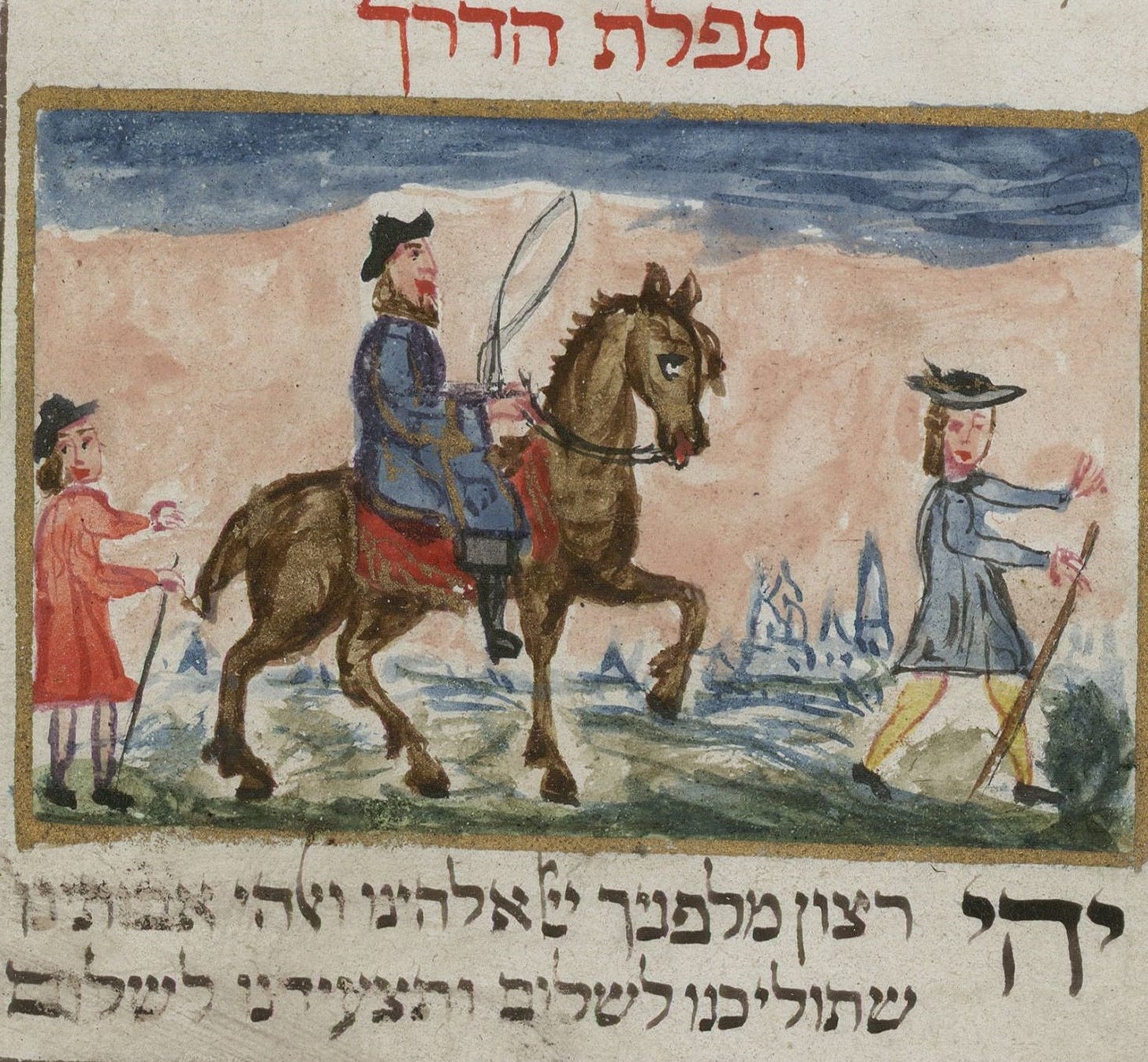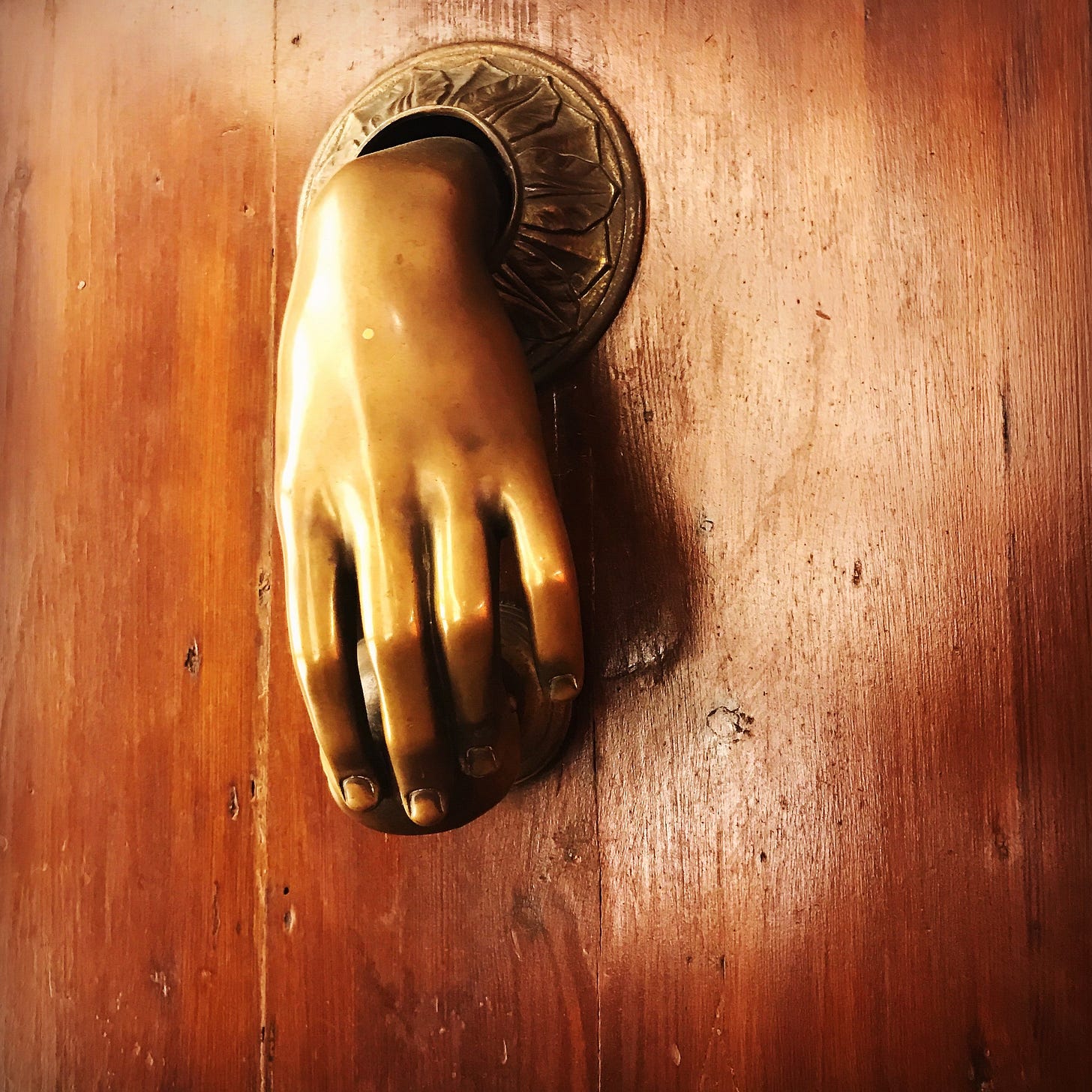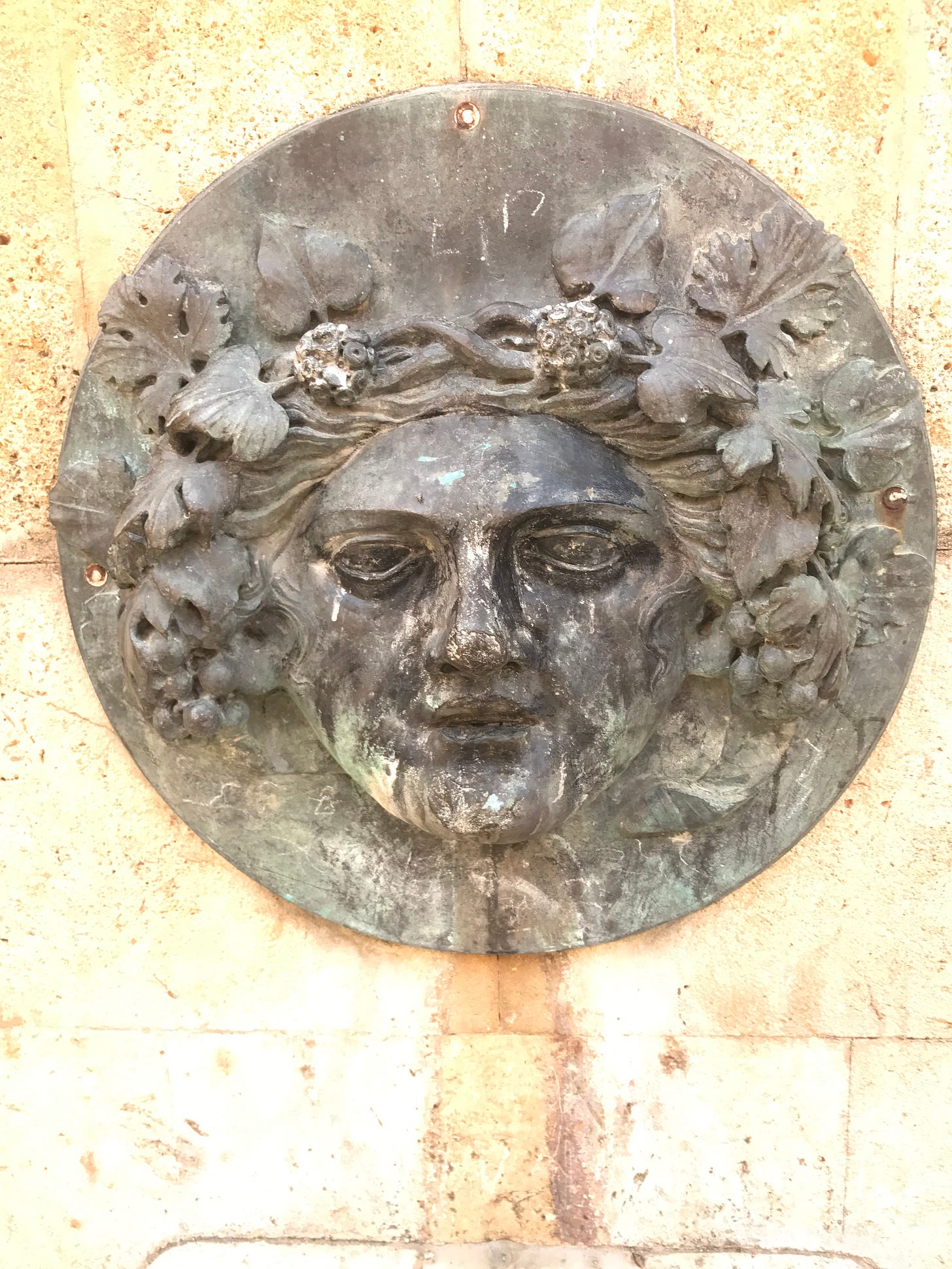Given the growing strife in the world these days, (and multiply that with the vast amount of volatility and derision that the United States election is currently generating), I’m challenged at the moment to write about an easy surrender to spontaneous travel.
My initial inquiry this week started off by exploring the idea of words that might be said, or even a prayer that could be invoked, to insure safe passage for a traveler en route to their destination.
(The Tefilat Haderech inscribed in a “siddur” or Jewish prayer book from the 16th century.)
My research led me to the “Traveler’s Prayer,” also known as the “Wayfarer’s Prayer” or “Tefilat Haderech” in Hebrew. A variant of the invocation has existed since the fifth century in the Talmud, the guiding centerpiece of Jewish culture. The prayer is most often times recited at the beginning of a longer journey and calls upon God to protect the individual during a precarious passage.
In the modern version, the petition begins:
“May it be Your will, Lord, our God and the God of our ancestors, that You lead us toward peace, guide our footsteps toward peace, and make us reach our desired destination for life, gladness, and peace. May You rescue us from the hand of every foe, ambush along the way, and from all manner of punishments that assemble to come to earth. . .”
Read the full version here as well as encounter the ancient devotion written in traditional Hebrew.
What strikes me in the prayer is the mention of “peace” no less than three times, signifying the vital importance of safety, tranquility, calmness, and quietude. Naturally one would want to travel to their destination, free of enemy attack and without concern for stray bullets or an occurrence of personal violence (something that in many areas in the world cannot be guaranteed).
It seems to me that to be more conscious on a trip, or more intentional on a journey, it would be necessary to deliberately incorporate opportunities for solitary contemplation, meditation, and self-reflection—one might set up a morning sunrise stretch for example, or schedule a thoughtful walk through a park. Certainly, there are numerous ways to cultivate desirable silence into a trip, or to look for ways to engage with more harmonious and ultimately, peaceful endeavors.
But this notion of underscored peacefulness in the “The Traveler’s Prayer” also reminded me of the work of the late John O’Donohue, an Irish poet who became famous for his breakthrough work, Anam Cara: A Book of Celtic Wisdom.
(The late theologian and poet-philosopher John O’Donohue left a mighty imprint on the notions of ancient Celtic culture and the art of cultivating wonder, before his untimely death at the age of 52.)
In the O’Donohue poem, “For the Traveler,” the reader discovers, as in “The Wayfayer’s Prayer,” the necessity for safety and quiet contemplation as the cornerstones of a successful journey. Taking a more secular view, O’Donohue’s poem encapsulates the idea that:
“When you travel, you find yourself/Alone in a different way,/More attentive now/
To the self you bring along . .”
Reading this line, I thought how provocative it is, that so often when we travel, we are more soulfully predisposed to becoming “self-attentive” —as though travel is the singular opportunity that so completely relieves the traveler from their mundane routines—leaving the voyager more supple and attuned to the overlooked needs going on within.
(Vintage door knocker in Barcelona)
O’Donohue asserts that indeed, “A journey can become a sacred thing,” and certainly this is the premise here in this travelogue, for pointedly investigating spontaneous travel—how any traveler can set up conditions, on any trip, for a surrender into sublime synchronicity and harmony.
He goes on to advise the reader:
“Make sure, before you go,/To take the time/to bless your going forth,/To free your heart of ballast/So that the compass of your soul/Might direct you toward/The territories of spirit/Where you will discover/More of your hidden life,/And the urgencies/That deserve to claim you. . .”
I have made so many attempts in my own life, to empty my heart of “ballast” (or a perceived stability), in order to freefall into a more organic, more authentic way of living. Moving to Paris in my early thirties for example, when I had yet to secure a solid job, and living on a dear friend’s sofa for nearly two years, felt like skydiving without a parachute—but it helped to clarify and strengthen my core values back then.
It still seems somewhat counterintuitive, to continue at this point to rid myself of anchors, and mechanisms for balance. But “ballast” can also refer to the things that weigh us down. Even now, this first extended year in Barcelona has been met with flagrant excess (poor sleep hygiene, elastic personal boundaries), psychological imbalances, and an onslaught of emotional romantic disappointments.
But that steadfast “compass of my soul” continues to reveal, without fail, “my hidden life,” and even at this point in my evolution on the planet, there is still so much to discover and embrace with a renewed and urgent gratitude.
(Illuminated globes in a shop window in Paris.)
The poem goes on further to say: “When you travel,/A new silence/Goes with you,/And if you listen,/You will hear/What your heart would/Love to say.”
That new silence is something I’m trying to stay close to. Meister Eckhart, the great Catholic theologian and mystic who prospered during the 12th century said, “There is nothing so much like God in all the universe as silence.”
It’s spontaneous traveling that can assist the wanderer in efforts to become still, silent, and empty the heart of the extraneous, in order to reground, and repurpose.
(Bacchus, Roman god of wine and pleasure, in a marketplace in Tarragona, Spain.)
Finally, O’Donohue offers a blessing to the reader: “May you travel in an awakened way,/Gathered wisely into your inner ground;/That you may not waste the invitations/Which wait along the way to transform you.
I share these last sentiments and hold them close to my heart. I feel these words to be part of my foundational mission statement for this ongoing travelogue.
It is my intention to reassert and explore the idea that travel is kindred to self-revelation, and the “awakened way” is something everyone can participate in, even if it’s simply traveling to a local park or an open field—what are the invitations that are whispering to you right now—faced with the difficulties and shattering uncertainties in life—where are the fertile opportunities to delve more deeply, more earnestly, and change, remodel, reshape, and metamorphose?
As the great poet T.S. Eliot declared: “We shall not cease from exploration/And the end of all our exploring/Will be to arrive where we started/And know the place for the first time.”
Resources:
Read and/or listen to John O’Donohue’s seminal poem, “For the Traveler” in its entirety (360 words) here.
Learn about the legacy of poet John O’Donohue here on the official website with links to his books and much more!
Postscript:
While exploring the Jewish tradition of the “Traveler’s Prayer,” I also came across different versions and adaptations of this benediction. An interesting one is found through Catholic Relief Services, with a plea to “Our Lady of the Highway” in their version. Another version here beckons Saint Christopher. In addition, I found Catholic blessings for automobiles and for starting a long journey.
If any reader has other examples of a traveler’s prayer or blessing, I’d love to know about it!
(All photos by Gerard Wozek or in alignment with Creative Commons.)
.









Gerry, thank you so much for introducing O'Donohoe to us. Prior to my reading this wonderful post, I was unfamiliar with his poignant words. The Hebrew prayer used to be more familiar to me; I would hold it in my hands and read the Hebrew whenever I traveled back and forth to college via plane in hopes of safe, peaceful travel. Nowadays, as you point out, peace is so elusive in the world. At the same time, I reflect that peace has always been elusive in some part of the world, and I've given up hope that peace will prevail. Despite this, I try to maintain a peaceful existence and treat others as I would want to be treated. I know this is a cliche, but there's so much truth to that.
I love this line that “'ballast”'can also refer to the things that weigh us down." Traveling spontaneously seems so liberating in many ways, yet we can also be weighed down by physical, emotional, and spiritual causes and so forth -- whether or not we travel. I so appreciate your candor. I find that life often weighs heavy on me -- either from watching too much news or emotional anguish. My form of travel has become the canvas, and with each brushstroke, I feel peace. Painting is the only true time I find solace.
Another great essay, Gerry. Thank you so much!